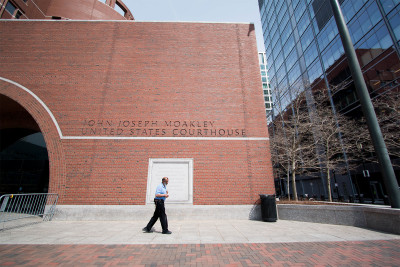
Nearly 6,000 inmates nationwide incarcerated for drug-related crimes became eligible for earlier release beginning Sunday as a result of an amendment to the U.S. Sentencing Commission guidelines.
In Massachusetts, 97 inmates have had their motions for sentence reduction granted, according to a Tuesday press release from the U.S. District Court of Massachusetts. Of those inmates, 40 were eligible for release and 17 eventually left prison Sunday.
Chief Probation Officer Chris Maloney said the release is not automatic and inmates must petition their sentencing judge for the opportunity to be released.
“Over the last year, inmates were allowed to petition their sentencing judge for a reduction in their sentence, and the probation prosecutor and defense attorneys would review those petitions and make recommendations to the judge,” Maloney said. “The federal district court judge would make the final ruling on whether or not to grant that motion or deny it.”
The effective date of the amendment was delayed until Nov. 1 to ensure that adequate time was given to all parties involved to prepare for inmates’ potential releases, the release stated.
Inmates are not released until sentencing judge deems them not a threat to public safety, according to the release. In Massachusetts, the probation office, defense and prosecution teams consider a defendant’s disciplinary record and history when inmates request early release.
Maloney said the impending release of inmates prompted the probation committee to hire several more officers in the past year to handle the influx of new cases.
“Everybody that comes under federal supervision is supervised according to the risk that they present,” Maloney said. “All of these inmates will be supervised that way.”
Chief Judge Patti Saris, chair of the Sentencing Commission, said it is important to make sure that the inmates will transition well into the community.
“The Probation Office is doing everything it can to make sure that the released offenders are provided with the services they need to succeed on supervised release and live law-abiding, addiction-free lives,” Saris said in the release
Of the nearly 40 eligible for release from Massachusetts prisons, the 17 inmates released attended a resource fair at the John Joseph Moakley United States Courthouse Wednesday afternoon.
“The goal of the fair was to connect recently released inmates with social service agencies throughout the community,” Maloney said. “We had about 20 different agencies represented yesterday.”
Attendees were able to meet with representatives from the Veteran’s Administration and Social Security Administration, as well as groups and programs related to health, education and employment.
Several residents shared varied opinions about the early release for prisoners.
Jeff Cooper, 45, of East Boston, said sentences for drug offenses should depend on where the crime took place.
“Getting released should depend on how serious your drug offense was and where it occurred,” Cooper said. “If you were in a school area, you deserve to serve the time.”
Tabitha Haggerty, 56, of Roslindale, said the early releases could be very dangerous in a lot of cases because people in the city are struggling with drug addiction.
“However, in a lot of ways it’s also extraordinarily useful to have that kind of freedom, you just have to reinforce that it’s a serious issue,” she said.
Norah Burch, 42, of Allston, praised the amendment and suggested that those released from prison should not have to report it to possible employers.
“If you didn’t commit a violent crime, if your only crime was to take a substance, it doesn’t seem as big of a deal and you shouldn’t have your life ruined over it,” she said. “The government should take the box off of employment forms where you have to check if you’ve been in prison before. There’s so much unfair stigma attached to being in prison, especially if it’s not for a violent crime.”




